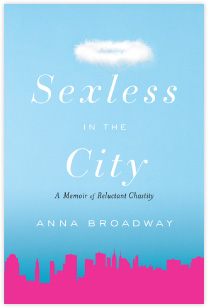Disclaimer: Normally I try to assume a broad audience for this blog, while writing from an undeniably Jesus freakish perspective. Besides, addressing conservative critics/questioners of my position is just exhausting. But in the last month or so I’ve faced rumblings not only against the project of this blog in particular, but against most writing on chastity in general as “unchaste” (interestingly, secular people, too, have made this criticism, based on a peculiar conflation of chastity with modesty with silence). As Lauren Winner’s book Real Sex has become a particular lightning rod for such critiques — particularly in certain religious circles — today’s entry will show a hopefully rare disregard for my secular readers and address those critics in more “insider” language than I usually use. The Sexless tone and focus you’re accustomed to should return with Friday’s post.I stopped reading chastity guides a while ago. Not that they’re all bad reading, but let’s just say my sentiments lay with a P.K. friend who joked he’d “given the dating the tongue” (he’s had more love-life success than I). Doesn’t it say something when that paragon of purity Elizabeth Elliot has one of the raciest treatments of sex and desire out there? Most such books read as if written in the rarified air of Colorado Springs.
A typically indoctrinated sort might agree with the reader who warned: “If you're going to send ‘sexy’ signals to guys on dates and not (to be vulgar) ‘produce,’ then you're going to lose the guys who can wait and you're not going to satisfy the ones who want it.” I had broadly implied that Jesus freaks endure sexless dates, while the freaked-by-Jesus do not, but
he assumes Christian men are either so overcome by desire (owing to the woman’s “sexy signals,” no doubt) they expect sex just the same or if they’re waiting till marriage barely want to have sex anyway.
Clearly we have a problem. It would be great if we could all learn about sex — not to mention, the Christian sexual ethic — from our parents or the church, and forget dating-and-mating guides altogether, but not everyone’s parents plainly inform adult children that they were having a “romantic evening” when you tried to call earlier. (Seeing as how mine didn’t start such announcements till I was an adult, my views on sex were already formed by then.)
Which views were formed less by the likes of Lauren Winner’s
Real Sex and much more by James Dobson’s
Love for a Lifetime, in which he breaks sexual intimacy into an elaborate 10-point schema. Imagine my shock when a frisky date’s advances showed me the portion between waist and neck was one contiguous zone, never mind breasts lay between. Dobson implied progression from stage to stage was well-marked and that somewhat-innocent kissing (from which one could easily slip to neck-contact, I reasoned) was far removed from high-intensity hand-to-breast contact. Recalling post-date that Dobson also put hand-to-head contact close to intercourse, I decided his outline might be somewhat flawed. What’s so hot about hair?
Winner’s “steps of the rotunda” approach to “how far is too far?” could not be further from Dobson’s detailed schema. But maybe that’s because her book is more honest about the struggles we face. Unlike many of the chastity-guide authors — whose hard-to-handle standards and recommendations proceed from apparent lack of either sin or sexual desire — Winner candidly acknowledges her own failings and the difficulty of honoring God’s high standards.
Which they are — high, and difficult. But this can only be discussed if you acknowledge the strength of the desire one seeks not to sublimate but to serve God by embracing and reworking. In its tendency to emphasize the intellectual over the emotional and physical, however, the evangelical church has hewed to a bankrupt theology of desire and sexuality. To its downfall,
Real Sex follows that tradition in emphasizing the Pauline perspective on marriage more than the Hebrew Old Testament teachings, minimizing the God-imaging (pro)creativity of Biblical love-sex-marriage. Thus Winner’s arguments against masturbation and for the communal aspects of sex (whereby why my neighbor has a right to care how — not just how loudly — I’m having it) sound labored at times. If she explicitly rooted human sexuality and community in the character of God and the Trinity (instead of our bodily creation), these points would have flowed with greater ease. Nevertheless,
Real Sex stands to move the discussion of chastity out of the pallid rut of undesire — and all the hypocritical deception such denial often produces in Christians — toward a more candid, convicting, fruitful dialogue about how to honor God with our relationships and bodies.
Perhaps most significantly,
Real Sex has also moved the Christian discussion of sex outside the coffee shops and, yes, bars where it’s raged thus far to the pages of the
New York Times and elsewhere. Why does this matter? A few years ago I reviewed a promising but mostly dismal collection of scholarly research called
Sex, Religion, Media. In the concluding essay, the editor bashed religious perspectives on sex as unhelpful rot best reserved for the private sphere, never mind the failings of the sexual revolution which my generation is just beginning to realize and rant about. We could use a few books like Winner’s to help both the Christian and the secular own and improve on their failings to adequately form sexual beings. May hers contribute to a more honest discussion of sexual ethics across the spectrum of belief. If honest, we just might begin to meaningfully and productively talk about sex in our homes, churches and formative communities, reducing the need for books such as this one altogether.
Labels: reading, sex



